A quiet but fierce war rages in Poland today for the hearts and minds of the citizenry. The Law and Justice Party (PiS), a right-wing populist party, appears to have a long-term plan to solidify power by weakening all the levers of democracy and civil society. PiS is led by Jarosław Kaczyński—technically just one of Poland’s 460 MPs, but in reality the man pulling the strings of the government. The party’s penetration into all aspects of Polish life—in a strategic attempt to create a new conservative, pro-Catholic nationalistic political order—is being waged against a weak and divided opposition that includes the previous ruling party, Civic Platform, and a burgeoning left-wing party, Razem, along with at least eight other opposition parties, most of them minor.
The print media in Poland appears to be diverse and plentiful, but the large number of magazines at kiosks is deceiving. After coming into office in 2015, the PiS took editorial charge of public radio and television, where news is now fashioned like a government press release with the tone of Trump’s most egregious tweets.
Social media, increasingly used in Poland among all age groups, is heavily penetrated by political manipulation. Activists are particularly likely to be caught in the crossfire, especially those that become visible in the public media. “Trolling is an everyday thing,” said one digital-rights advocate. “All activists know it is a part of their life now.”

It is as likely that the government is using this as a maneuver to solidify their support by challenging the EU as it is that they will go ahead with the judicial changes.
Yet, even though the center and left political parties are in disarray, there is a vibrant and well organized network of organizations fighting back. In late July, large street demonstrations successfully challenged the government’s plan to take control of the nation’s high court (although the Polish government continues to challenge the EU governing council’s threats by voicing support for judicial reform still to come). It is as likely that the government is using this as a maneuver to solidify their support by challenging the EU as it is that they will go ahead with the judicial changes, but many I met fear that the government will ultimately ignore the street protests and the EU and take control of the courts. Last October, there were successful protests against rigorous proposed anti-abortion laws in this profoundly Catholic country. The nonprofits forming this protest network support a range of issues, from democracy to gender equality and LGBTQ equality, and are led largely by millennials, for whom the fight against Soviet authoritarianism is either a distant memory or simply the stuff of history books.

Yet in a nation where competing histories are constantly being used by opposing sides to score political points, certain leading figures in that fight still loom large. Among the most important of these leaders is Adam Michnik, whom I met recently in his office at the New York Times of Poland, Gazeta Wyborcza. The offices themselves have taken on something of a Google-like caste, as smartly dressed millennials mingle with baby boomers amid trendy snack bars and work stations. The building housing them is a sleek, modern outpost on a residential side street, home to a diversified publishing empire of which the newspaper is one piece (and not a profitable one, behind subsidiaries in social media, publishing, advertising, cinema, radio, and so on). Atop the reporters and bloggers sits Adam Michnik, Gazeta Wyborcza’s editor-in-chief and the iconic intellectual of the Polish Solidarity movement that led the revolutions in the 1980s and early ‘90s.
Imprisoned for his anti-Soviet activities, forced from university when he was a young revolutionary, Michnik has been the editor of Gazeta Wyborcza since its founding in 1989. Gazeta was once known as the voice of the revolution. But it is now more the paper of and for the intellectual elite, a slice of society in which most of the original group of Solidarity intellectuals now find themselves.
I wouldn’t like my children to live in a country submitted to the dictatorship of haters and fools.
Michnik chain-smoked as we sat in his book-strewn office, with citations, honorary degrees, and photographs recording his decades in the public eye mounted on the wall. With the help of translator Dawid Krawczyk, a journalist and managing editor of Political Critique (Krytyka Polityczna), a Warsaw-based social democratic/left journal and publishing house that has a collegial relationship with Dissent, Michnik and I discussed the government’s war against independent media and the courts.
“As an editor of a newspaper, I can say that there is now free media in Poland, but they took over public radio and TV and made it into a party institution,” say Michnik, reflecting on the precarious nature of his paper’s finances. “They say they are coming after us now . . . the state-controlled businesses are not allowed to advertise in our papers, only in the pro-regime paper, and public offices have been told not to subscribe.
“I wouldn’t like my children to live in a country submitted to the dictatorship of haters and fools. I will do my best to secure better for them. For now, they allow us to write and live but I feel like this atmosphere is much tenser. What’s important in Poland is that there is no fascism right now, but there are fascists active not being punished.”
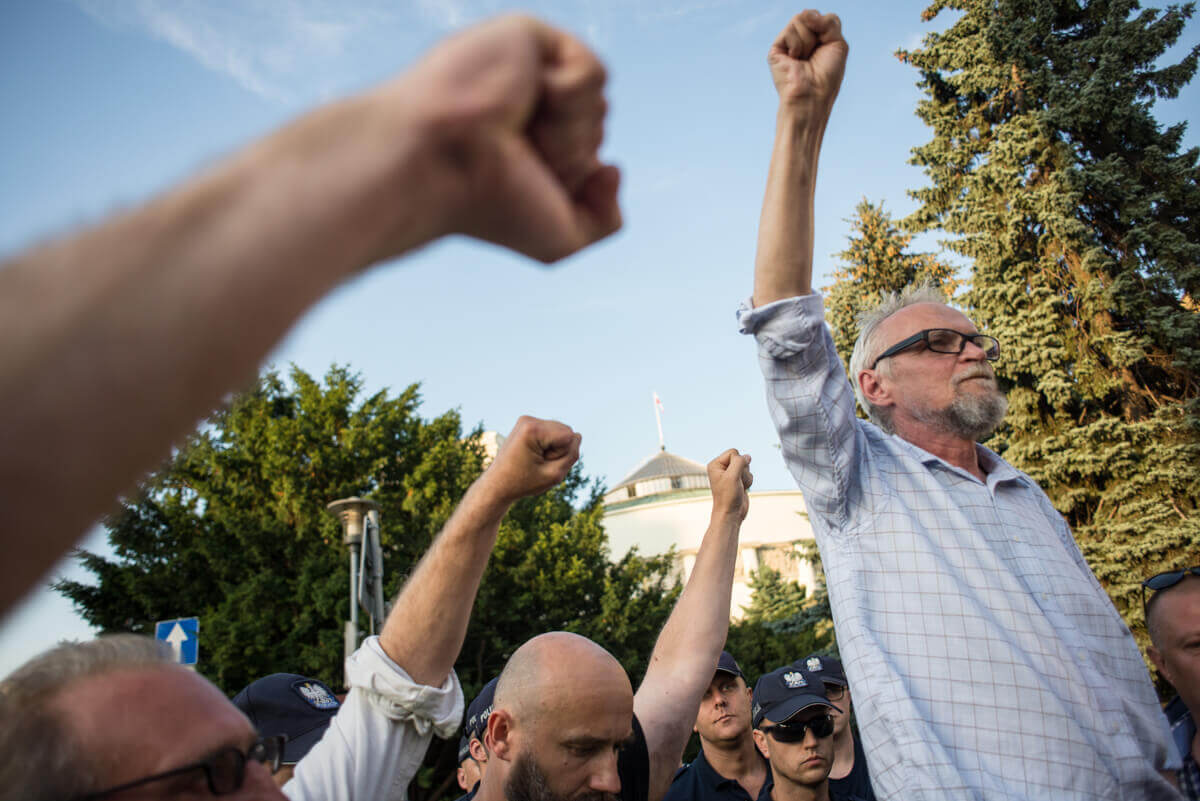
Referring to the country’s current leadership, he continued with a big grin, “they are so happy about Trump!” In a more sobering moment, he said: “Trump’s election is a catastrophe for Poland. I hope for the democratic institutions in the U.S. to constrain him. How is it possible that the U.S. could elect a clown? The Trump administration just greenlighted authoritarian leaders in this part of the world.”
The government wants a collision. I think they don’t respect European values.
The EU has threatened to invoke harsh measures if the Polish government does indeed take over the courts, and they are watching the government’s war on the media. Michnik is pessimistic that this will do much. “I’m not sure they will just accept what the EU says, though most Poles want to stay in the EU, according to public opinion polling. The government wants a collision. I think they don’t respect European values. They would be very happy if Wilders and Marine Le Pen won,” he mused, referring to the Dutch and French far-right leaders. “They are psychologically anti-EU because they are anti-liberal.”
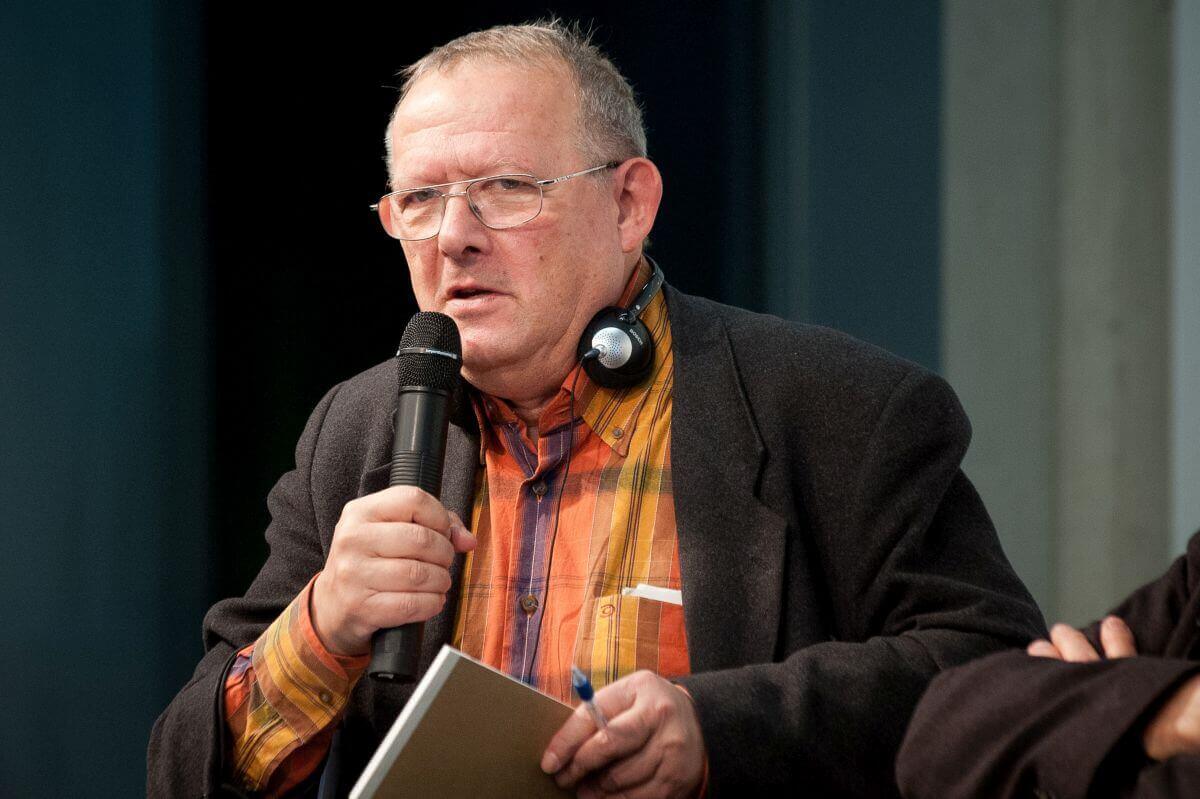
Poland, as the first domino to break away from Soviet domination, also led the way for the other breakaway countries—and even the Soviet Union itself—to turn away from communism. However, for those of us who hoped that this transition would lead to social democracy, the reality is jarring. Could something have been done differently?
A dictatorship keeps gangsters away, so people are comforted by authority.
“For us, from the democratic opposition—where I served for twenty-five years—when I was underground and in prison, it seemed that the key to everything is freedom, national and human rights, but in these societies, there is a very strong trace of the concept of ‘escape from freedom’ [also translated as fear of freedom], as Erich Fromm wrote. It turns out that for hundreds of thousands of people, security is more important. When the police state is over, there is fear for personal security, safety. A dictatorship keeps gangsters away,” he reflected, musing that people are comforted by authority—a difficult idea to swallow for someone who went to prison numerous times for the dream of breathing free air.
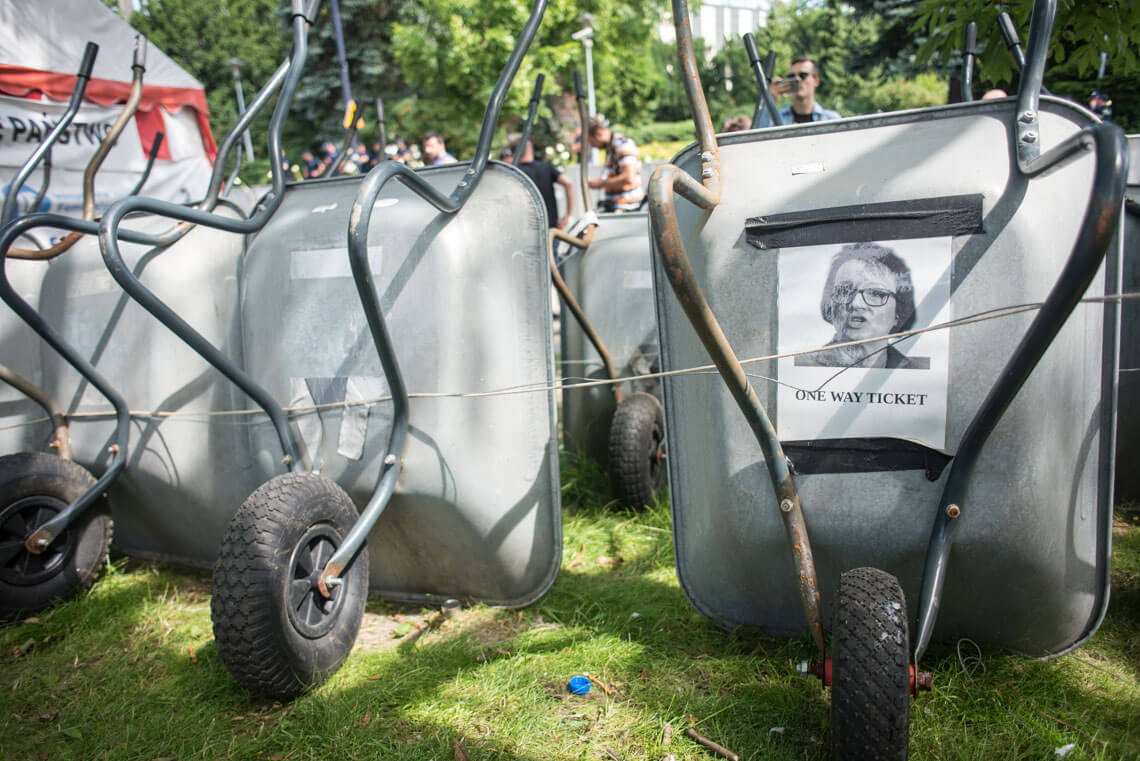
“There is a fragile structure in our young democracy, but we believe that there is no way back from democracy. We have NATO; we have the EU, at the same time we have Brexit. We have these two [competing visions of the future],” continued Michnik. “What I say now is very subjective. I am actively engaged in the conflict. I am among those who are most strongly attacked by propaganda. I would say that today, [PiS party leader] Kaczynski woke up vast demons in the Polish soul, like xenophobia. He is not anti-Semitic; he is anti-liberal. He won’t say Michnik is a Jew; he will say Michnik is from a Communist family and that he, Kaczynski, is from a patriotic family.” (Michnik was raised as a secular Jew; his parents were leaders in the Ukrainian regional communist party).
Autocracy wasn’t built in a day: How PiS build their regime bill by bill
The hope that strong social democracies would take the place of the Eastern Bloc countries, from Poland through the rest of region, faded fast. No party with a serious chance at power today promotes economic egalitarianism. Instead, the region is dominated by a mix of neoliberal economic policies and conservative social ones. Many blame this on Michnik and his minions, who, very early on, brought in economists who administered “shock therapy,” that cold shower of capitalist reform, to the collapsing Soviet system. Solidarity, the unique trade union movement that led the revolution in Poland, today serves more as a marketing brand name, with its familiar red logo and font, than a force for economic and social justice.
Our leaders were more focused on economic growth and infrastructure, and less interested in people in poverty.
I asked him what he thought about that. “I don’t know what neoliberal policies were in the Polish context, because we had a transition from a centralized to a market economy and of course, there were winners and losers. It’s a feature of a market economy. Our leaders were more focused on economic growth and infrastructure, and less interested in people in poverty. This was exploited by Kaczynski’s party,” Michnik postulates, referring to the PiS party’s appeal among those left behind by liberalization. In describing his sense of what happened, he seems genuinely baffled by this desire among the poor for economic well-being above all. This is where Michnik’s own liberal and not social democratic or socialist leanings began to show, and while I agree with him that the PiS-led government is cynically manipulating this economic insecurity to hold on to a base in Poland’s more conservative pockets, the fact is that the lack of an economic program that showed most people a better future for their children was a significant failing among all of the revolutionary governments that broke from communism.
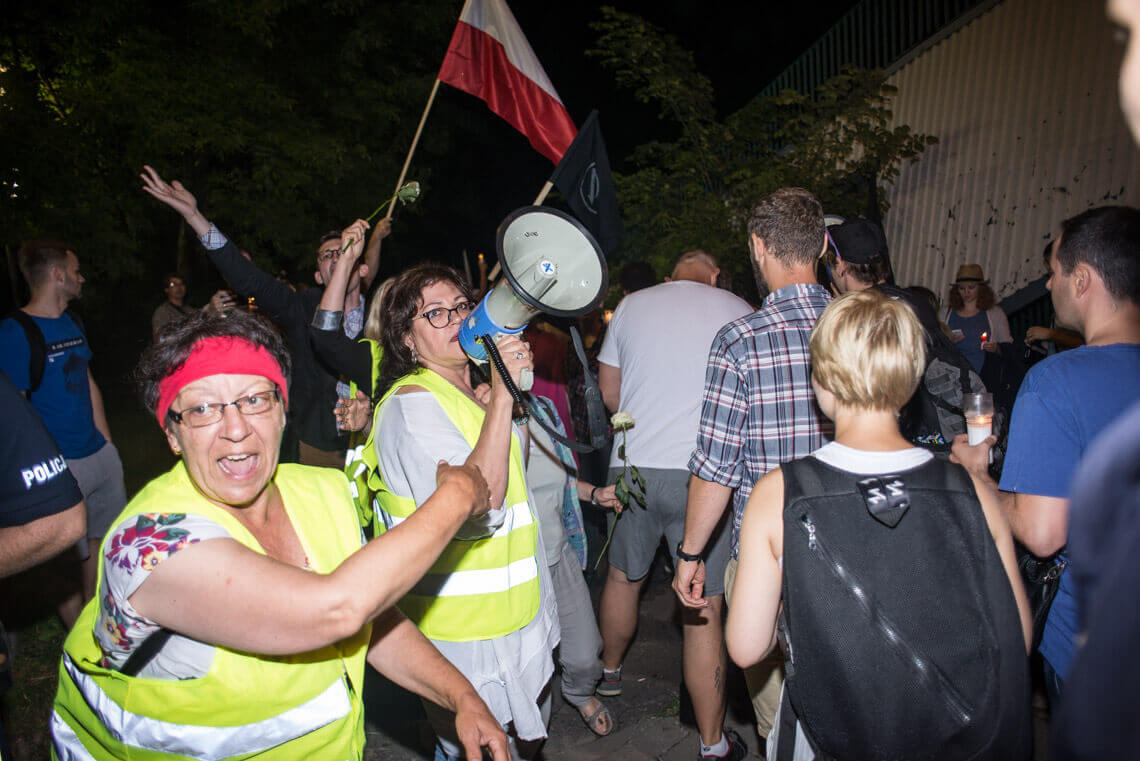
Was there another way? I brought this same question to another former Solidarity leader, Konstanty Gebert, who is today a foreign affairs columnist and reporter for Gazeta Wyborcza. “The idea was that radical liberal economic reform was the only game in town. Jacek Kuroń [one of the leaders of KOR, a precursor to Solidarity] repeated that we first must build capitalism to then milk it for socialist purposes. And the reforms worked: hyperinflation was curtailed and goods appeared in shops again. Everything else smacked of socialism. The new leadership was aware of the social cost, but called it the ‘unavoidable price of transformation.’”
It is when the workers realized inequality is being inherited that they started to rebel.
“The working class initially bought it,” said Gebert. “They thought they were trading equality of income (largely hypothetical anyway) for equality of opportunity: they expected their children will have, once the transformation is complete, as good a start in life as anybody else. It is when the workers realized inequality is being inherited that they started to rebel. They were willing to be yet another generation serving as the manure of history—but they were supposed to be the last one.”
“In the underground, we were all ‘us’ against the ‘them’—now the workers started to fear that the elite part of ‘us’ was becoming the new ‘them.’ Cultural differences, hitherto immaterial, started to become relevant again, as indicators of alienness,” Gebert explained, referring to most Catholics among the workers and a high percentage of Jews among the intellectuals and opposition, or atheists of Jewish origin. “And it went downhill from there.”
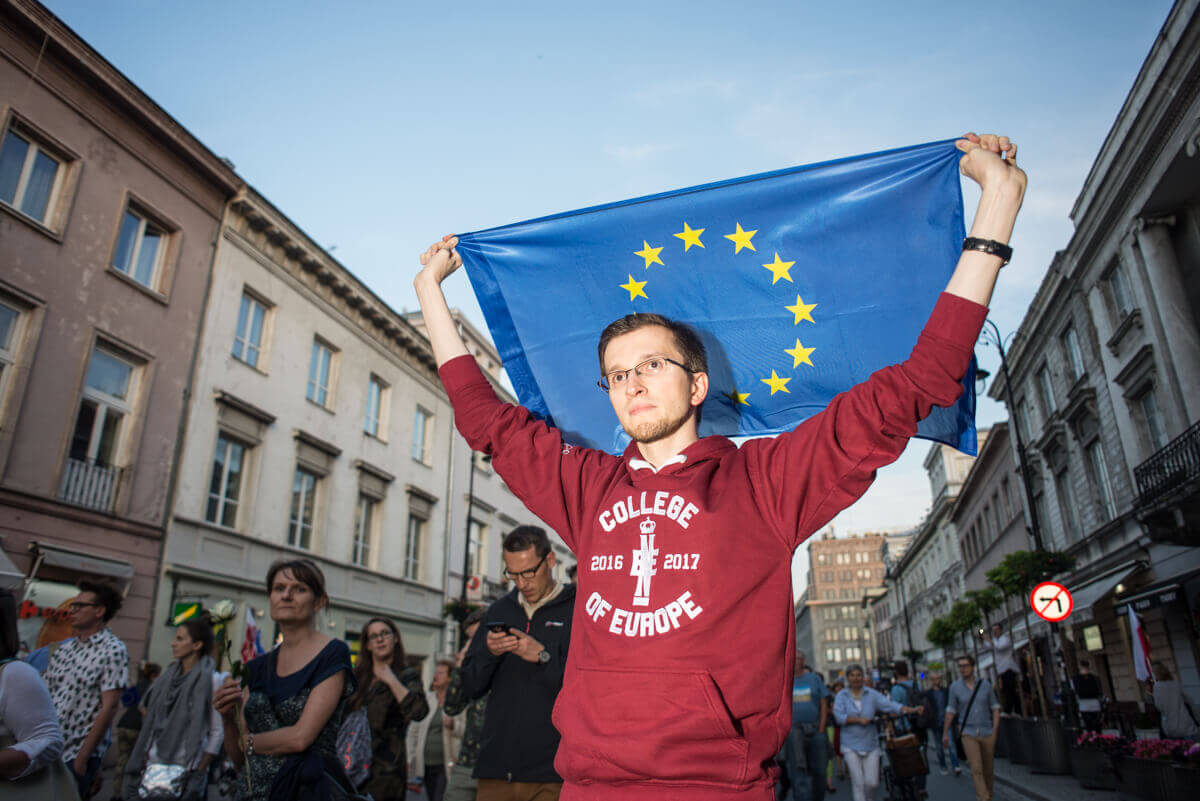
Certainly, this is something that many of the young activists on the streets of Poland today are forced to grapple with as the hearts and the minds of the non-elite intellectual class are captured by a dangerous conservative right.
Here’s how Gebert summed it up: “In history everything could have been different. Post-‘89 transformations offer only negative counterexamples. On the other hand, who knows: maybe we would have become the positive one, had we adopted the then much-ridiculed ‘third way’ [in this context, social democracy or a ‘mixed’ economy]. In any case, the belief that ‘it cannot be different’ (keine Experimente!) was part of the problem, because it tended to delegitimize any criticism.”
Heroes who toppled communism left a huge gap into which xenophobic, corrupt right-wing governments are now stepping.
Yet the failure to maintain a strong social welfare state in the wake of communism directly helped fuel the right-wing attack on the courts, the media, culture and increasingly, academia that Poland is witnessing today. By disregarding the need for a stable economic foundation expressed by many of their compatriots, the extraordinary heroes like Michnik who toppled communism put their own project of growing freedom and democracy at risk. They left a huge gap into which xenophobic, corrupt right-wing governments are now stepping, in Poland and across the region. The previous government, under the Civic Platform party that has since nearly disintegrated, promoted human and personal rights and freedoms, but also gave free rein to its business allies. Moreover, it neglected the real poverty and economic fear afflicting those not winning out from the reforms it oversaw. Perceived as a legacy of the very heroes who toppled communism—now an intellectual and cultural elite, according to most Poles—Civic Platform therefore strengthened the divide between the elites and those who now cling to the hope that the PiS party will finally stand up for them.
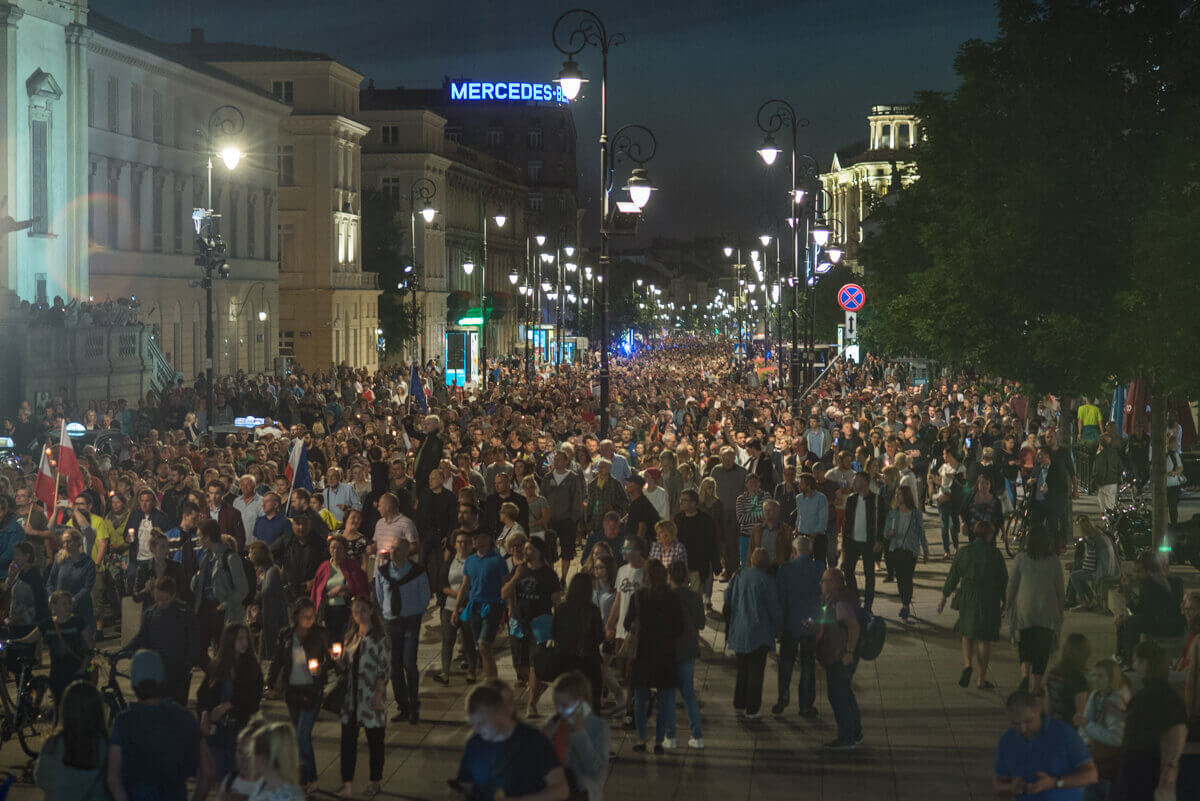
Unlike the Trump administration, the PiS government is successfully making some economic changes to benefit its base. It is even helping keep the coal mines open—echoing Trump’s promise to the miners in West Virginia, but matching it with state subsidies to keep coal afloat despite its diminishing viability (ironically shadowing a Soviet style economy of keeping workers working in spite of the need for their product). A cornerstone of the PIS government’s social policy is a monthly subsidy of 500 zlotys (about $140 USD) that they are providing to families with a second child. This not only aids family welfare in a direct deposit framework, but it encourages larger Catholic families, who form a significant part of the PiS’s base. This reform, which Michnik dismissed in our conversation as a cynical move, is not perceived that way by those Poles, who feel real relief when they receive the checks. This majority now believes that the PiS government is on their side, cynical though the party’s aim may, in fact, be. As Michał Sutowksi of Political Critique told me: “Kaczynski doesn’t know too much about economics, but what is interesting to him is sovereignty and what kind of economic policy can help sustain power.”
Meet the people who fought to stop the disastrous judiciary reform in Poland
Just ask a taxi driver, as any journalist is quick to do. As I watched Warsaw through the windows of my taxi en route to Chopin Airport, my taxi driver told me: “The old government was good for business and Europe”—not the people. Having graduated from high school in the late 1980s, his memories were not about communism, but about feeling left out of the prosperity that communism’s collapse provided for others. “The new government accepts normal people—it’s for poor people. 500 zlotys is a big change for these people,” he said as he pointed out the bumper sticker on the car in front of us that read 500+, the slogan of the popular second-child campaign.
My driver, who kept insisting that he didn’t follow politics, did reveal that he had been closely following the fight over the judiciary and that he was concerned that the PiS party had pushed too hard. “It’s very good that the president vetoed the judges issue,” he told me. (The veto marked a first for Polish president Andrzej Duda, a faithful member of PiS.) “It’s dangerous for our country, dangerous for democracy. I like this president,” he concluded, hoping to keep me from asking him more political questions so that he could press me for advice on where he should go on his upcoming first visit to the United States, besides fulfilling his lifetime dream to see the Grand Canyon.
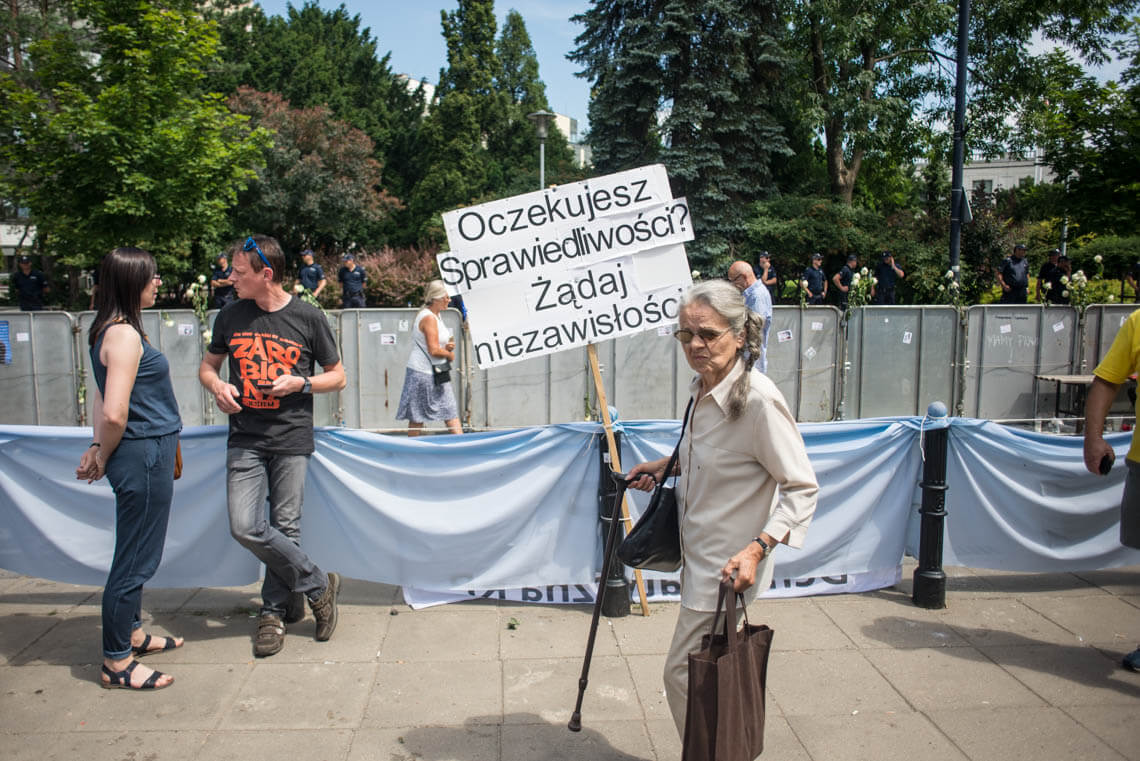
While the PiS party rails against Europe and the EU, seeking to build a new Polish right-wing nationalism, university-age and millennial Poles feel otherwise.
As the largest economy in Central Europe and the eighth-largest in the EU, Poland is still key to the future of the region, just as it was in the late 1980s and early ‘90s. If there is hope, it is with the younger generation, which feels the benefits of life in the EU and whose worldview is not shaped by memories of life under communism. While the PiS party rails against Europe and the EU, seeking to consolidate its more rural, conservative base and build a new Polish right-wing nationalism, university-age and millennial Poles feel otherwise. “Leaving the EU could trigger mass protests,” Krawczyk told me. “The EU is part of the historical identity of my generation. It’s so strongly rooted that you must have a position regarding the EU. And the base of PiS has a significant economic stake in the EU [too], even if their cultural heart is at home in the Polish countryside. The biggest beneficiaries of EU integration are Polish farmers.”
While the current crisis in Poland does not feel like class war, it is class warfare of its own sort—much like the one that brought Trump to power in our own country—as a vocal, conservative segment of the working class faces off against the liberal elites it has long seen as ruling the country from on high.
Freedom must include freedom from want—that is, economic equality and opportunity.
Without a more inclusive alternative on offer, crude, xenophobic populism takes hold. How the liberal elites, in Poland and elsewhere, respond will determine whether values that these same elites hold dear—like freedom and democracy—can indeed be nourished. Freedom must include freedom from want—that is, economic equality and opportunity. The strength of the organizations that put tens of thousands of people on the streets in early July could play a major role in changing Poland’s course, much like the groups that have proliferated in the wake of Trump’s election here. But they will only succeed with electoral counterparts to match them—counterparts that can shift the political winds enough to finally allow social democracy to get its chance in Poland. Razem, a left-wing party formed in 2015, represents the politics of many of these groups, but it is still a relatively fledgling and small political force.
Despite rosy projections from some economists, the legacy of the shock-therapy 1990s is still acutely felt today. Poland’s GDP per capita is among the lowest in Europe, ranking just above that of Greece. Economic insecurity—and a sense of being stuck for future alternatives—is widespread, and discontent along with it. Can a new democratic left gain enough stature to offer a tangible alternative to the right-wing populism strangling Poland today, and recapture the hearts and minds of an angry working class in the process? This remains the unanswered question from the momentous revolutions that collapsed the communist states.
![Political Critique [DISCONTINUED]](https://politicalcritique.org/wp-content/uploads/2015/09/Political-Critique-LOGO.png)
![Political Critique [DISCONTINUED]](https://politicalcritique.org/wp-content/uploads/2015/09/Political-Critique-LOGO-2.png)
haha.. what a crap-article,
adam michnik is a liar and one of the most hated person in poland.. his father was judge in the PRL-times and has sentenced national-heroes to death!!!! .. his brother has also killed brave poles and had to flee to sweden..
you people suck